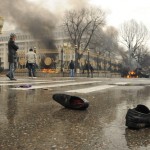Contributed by Eric Ullestad,West Des Moines, IA
Warm-up Question
If you had to suddenly move to a new town and could only take three things with you, what would you take and why?
Strangers in a Strange Land
 Escalating ethnic violence has prompted over 120,000 Kyrgyzstan (KUR-gi-stahn) refugees to flood into the neighboring country of Uzbekistan. Fighting broke out on June 9 in the Kyrgyzstan city of Osh between ethnic Kyrgyzs and Uzbeks. Within three days, the violence had spread to Jalal-Abad, which required the interim government leader, Roza Otunbayeva, to declare a state of emergency. These skirmishes reflect a larger state of unrest in Krygyzstan since president Kurmanbek Bakiyev was ousted in April.
Escalating ethnic violence has prompted over 120,000 Kyrgyzstan (KUR-gi-stahn) refugees to flood into the neighboring country of Uzbekistan. Fighting broke out on June 9 in the Kyrgyzstan city of Osh between ethnic Kyrgyzs and Uzbeks. Within three days, the violence had spread to Jalal-Abad, which required the interim government leader, Roza Otunbayeva, to declare a state of emergency. These skirmishes reflect a larger state of unrest in Krygyzstan since president Kurmanbek Bakiyev was ousted in April.
The official death toll is around 200, but local Kyrgyz and Uzbek leaders estimate that number will be over 1,000 by the end of the month. Though the violence was initiated by ethnic groups of Kyrgyzs against Uzbeks, the Foreign Ministry of Uzbekistan has offered their country as a safe haven for Kyrgyzs who fear for their lives. The United Nations has declared the situation a “humanitarian crisis” and called for countries all over the world to send aid. The United States, Germany, and Russia, have been among the first to respond. “There is an urgent need for food, water, tents, and medical supplies,” said one Red Cross volunteer. “Nearly half a million people are homeless. They need help now!”
Discussion Questions
- What have you heard about Kyrgyzstan in the last few weeks?
- How would it feel to be one of the 400,000 displaced by the violence?
- What are ways that our country can help bring an end to the fighting?
Scripture Texts (NRSV) for Sunday, June 27, 2010 (Fifth Sunday after Pentecost)
(Text links are to Oremus Bible Browser. Oremus Bible Browser is not affiliated with or supported by the Evangelical Lutheran Church in America. You can find the calendar of readings for Year C at Lectionary Readings.)
For lectionary humor and insight, check the weekly comic Agnus Day.
Gospel Reflection
Much like the news coming out of Kyrgyzstan and Uzbekistan, the gospel text is about two things – hospitality and urgency. Prior to the events of Luke 9:51-62, Jesus has been very busy. He empowered and sent the disciples to preach, teach, and heal. He fed five thousand men (plus women and children) with five loaves of bread and two fish. He became transfigured on a mountain in the presence of Peter, John, and James (not to mention the ghosts of Elijah and Moses). He even healed a demon-possessed boy. Talk about a busy couple of weeks!
Jesus sets out for Jerusalem and realizes that he will need a place to sleep along the way. He sends messengers ahead to a Samaritan village to see if they would host Jesus for the night. Because of ethnic and religious differences, the Samaritans refused to let Jesus into the village. James and John are ready to respond by wiping the village off the face of the earth. However, Jesus wants no part of a violent response to the Samaritan’s lack of hospitality. Instead, they find another village.
The second section of the gospel text demonstrates the urgency of discipleship. Jesus approaches two people with invitations to follow him. Both men are willing to follow, but one wants to take a day to bury his dead father and the other wants to say goodbye to his family. To many these requests seem reasonable. However, Jesus implores them to follow him immediately and not waste their time with farewells. Why? Perhaps he knows that if these people return to their loved ones, it becomes less likely that they will return to follow Jesus. It’s also possible that Jesus has work for them to start right away and can’t afford to let them waste any time.
We can discern a lot of things about the nature of Jesus from the end of Luke 9. Specifically, Jesus refuses to use his power to punish people and he has a sense of urgency for people who want to follow him.
Discussion Questions
- How would you respond to someone who refused hospitality to one of your friends?
- How do you feel about Jesus’ sense of urgency in talking to a would-be follower? Why wouldn’t Jesus let the man take a day to bury his father before joining Jesus?
- What do you think Jesus means when he says “No one who puts a hand to the plough and looks back is fit for the kingdom of God”? How would you feel if Jesus said this to you right after one of your parents died?
- If Jesus were physically present today, what words might he have for the people of Kyrgyzstan and Uzbekistan, based on his words and actions in Luke 9:51-62?
Activity Suggestions
Contact your local Red Cross to see how you can help respond to the crisis in Kyrgyzstan. This might include assembling care packages, writing letters to displaced families, or collecting a special offering for money to send. Remember to pray for the people who have been affected by the violence in that region.
Closing Prayer
God, help us to show your hospitality and care for those in need. Give us a sense of urgency in sharing the good news of your son, Jesus, with the whole world. Thank you for the gifts you give us. Amen
